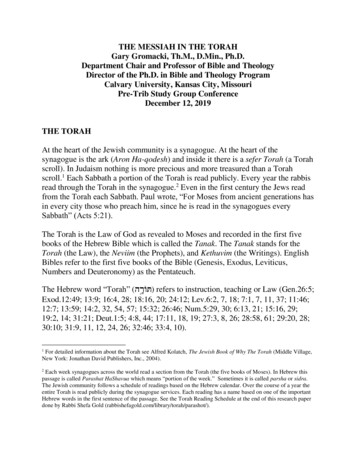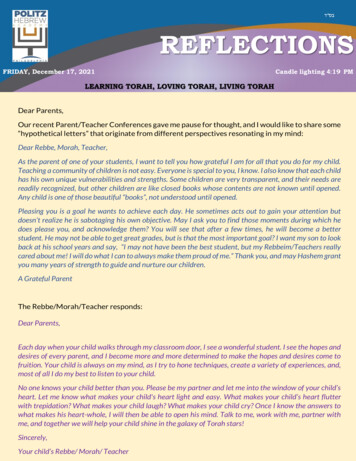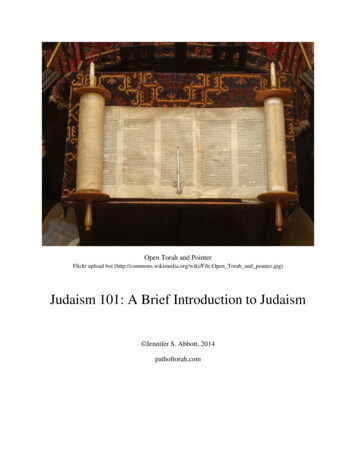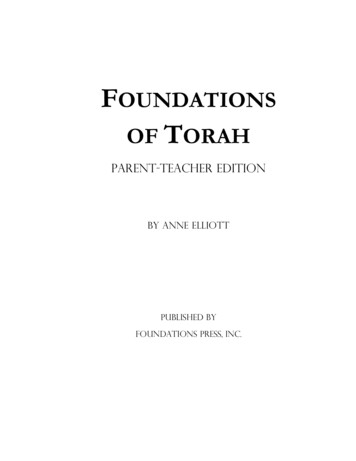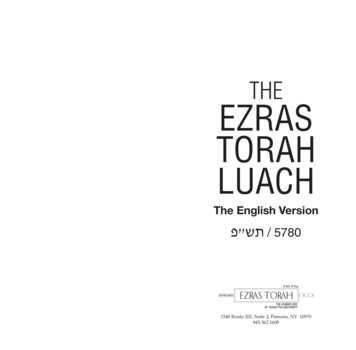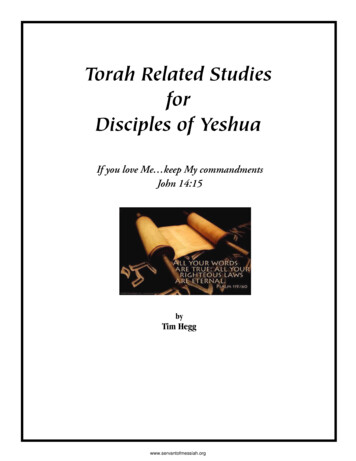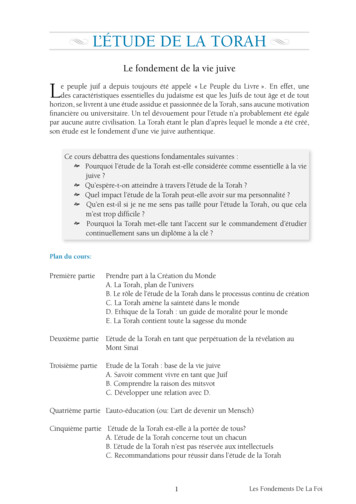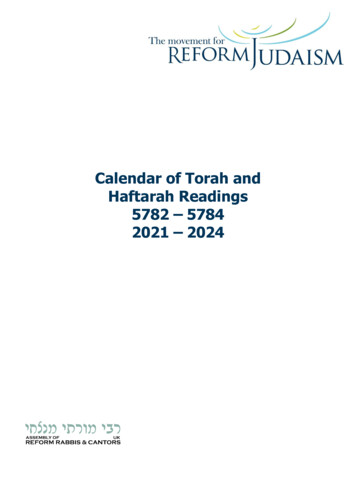
Transcription
2Torah Judaism International’s“Ways of Torah” Siddurwww.TorahJudaism.orgPrinted by BeJEWISH PublishingBJPub.comTranslation and editing by:Rabbi Yusef EliyahRabbi Asher Meza2012 Denver, ColoradoThis Siddur can be heard on our online his siddur was developed for the purpose of givingindividuals a better grasp on the duty of prayer.Unlike any other siddur, the “Ways of Torah” prayer bookis based on the structure of prayer as laid down in theRambam’s Mishneh Torah, while including only thosewords of prayer brought down by both R’ Saadia Gaon andthe Rambam. The result is the world’s most concise halachicprayer book ever complied in over a millennium.The goal of this siddur is to make prayer meaningful again.We therefore intend to translate each of our prayer booksinto only one language, so as not to compromise devotion.We at Torah Judaism International hope you enjoy the“Ways of Torah.”* Sections in small print only read with a minyan; small non-italic text is said aloud in unison.
3Table of ContentsModesty & Prayer4-5Wrapping of Tefillin6 -7Postures in Prayer8 - 11Bedtime Shema12Morning Blessings (Birkoth ha-Shahar)12 - 15Morning Prayer (Shaharith)16 - 25The DecalogueAfternoon Prayer (Minha)Counting the Omer2627 - 3132Nighttime Prayer (Arvith)33 - 37Sabbath Nighttime Prayer (Arvith Shabbath)38 - 42Kiddush43Sabbath Morning Prayer (Shaharith Shabbath)44 - 50Sabbath Additional Prayer (Musaf Shabbath)51 - 54Sabbath New Moon (Musaf Shabbath Rosh Hodesh)55 - 58Fasting (Som)58 - 59Sabbath Afternoon Prayer (Minha Shabbath)60 - 65Sabbath Conclusion Prayer (Arvith Motz”ash)66 - 71Havdalah71Hallel72New Moon Additional Prayer (Musaf Rosh Hodesh)75 - 77New Moon Blessing (Birkath ha-Levana)78Hannuka78Blessings on Food (Birkath ha-Mazon)79 - 81New Moon & Holiday Additions82Short Version of Standing Prayer83 - 84Prayer Times (Zmanei Tefilla)85
4IntroductionModestyBefore praying, one should make sure hisclothing is fit for 'standing before God.'One should not pray in an undershirt or withouthis head covered - whether male or female, norwith his calves showing, unless one wouldstand that way before esteemed individualsof his locale; and students of the Sagespray cloaked in a prayer shawl;(Laws of Prayer 5:5)The Hebrew word for modesty,"sani'uth," is usually rendered as'modesty,' but the word alsoindicates restraint, subduedness,and humility - all fundamental toliving a life in the service of God.And so it is written, "It has beentold to you, O man, what is good,what the LORD requires of you:that you act justly, love compassion,and walk subdued (hasneiya')with your God;" (Micah 6:8)Despite the decline of modestyaround us, the essence ofmodesty (sani'uth) remains thesame. One's thoughts, words,deeds, and dress shouldreflect a state of humilityand subduedness beforethe All-Knowing Creator.This is why our Sages taught thatone should behave modestly evenwhen no one else is present; forthere is One Whose knowledge isever present, and He is worthy ofour reverence. Jewish modesty, ormore accurately - subduedness, ismore importantly about inspiringawe and reverence for the Creator,than about sexuality.
Introduction5This is why our Sages taught that students of the Sages should not walk aboutwith their heads uncovered or in tight or transparent clothing that reveals theform of the body. Similarly, they taught that students of the Sages should wearlong sleeves and that their garment extend to the ankle;(Laws of Character, chap. 5)The Sages taught that husbands provide their wives with modest loose fittingclothing, including head coverings that she can wrap herself in;(Laws of Idolatry 12:13; Laws of Women 13:13; 24:11-12)Due to the norms and influence of western culture, the level of modesty indress among modern day religious Jews has drastically changed from what itwas in the not so distant past. The extent of this relatively quick change isespecially pronounced among the Jews of Yemen who, within only 60 years,saw their men abandon robes for short sleeve shirts and their women veils forwigs, or no hair covering at all.The historical manner of head covering for Jewish women was that in publicplaces they covered both their hair and their necks, and elsewhere outside oftheir homes they were careful to at least cover their hair;(Laws of Women 13:13; 24:11-12)Our Sages taught, "The daughters of Israel should not go about with theirheads uncovered in a market place, whether she is available for marriage oralready married." (Laws of Forbidden Relations 21:17)If a woman should be forbidden from covering her neck because the practiceis also found among Muslims, even though Jewish women covered their neckslong before the rise of Islam, then please consider the fact that many EasternOrthodox Christian women cover their hair exactly as most religious Jewishwomen today do - they cover their hair while exposing their neck. Christiansalso give charity to the poor and do other things in common with Torahobservance. Should we stop these practices just because they also do them?There are also a number of countries where the Muslim women cover their hairbut not their necks. If a Jewish woman should not cover her neck becauseMuslim women also cover their necks, then she should also not cover her hairwhile exposing her neck the way many Eastern Orthodox Christians,Ana-baptists, and some Sub-Saharan Muslims do. But rather, as RabbiAvraham, son of the Rambam, wrote: "No Torah commandment or practicethat the prophets or Talmudic tradition teach may be ceased just because thenations copy it."
6Introduction
Introduction7TEFILLINThe commandment of tefillin can only be fulfilled from after dawn till sunset,and not on the Sabbath or Biblical holy days. It is only mandatory for men.Right handed individuals place tefillin on their left arm. A left handedindividual puts the arm tefillin on his right arm. An ambidextrous personplaces it on the left arm. The box of the arm tefillin should be placed on themiddle point of one's bicep pointing inward towards the heart. It should beroughly two finger-breadths from the inner side of the elbow joint.After putting the arm tefillin on one's arm, but before wraping it, bless:Worshipful are You O LORD our God, King of the Universe, Whosanctified us with His commandments and commanded us to place tefillin.There is no required amount of times one must wind the strap around one'sarm. The strap must be able to reach the middle finger, wrap around it 3times, and be tied. The diagram shows the tradition of wrapping tefillinaround one's hand among the Yemenite students of Rambam the Sefaradi.They continued to go by the Rambam until modern times.Once one finished tying the arm tefillin strap in place, one then places the headtefillin on one's head.If an interruption that was unrelated to putting on tefillin was made betweenputting on the arm tefillin and putting on the head tefillin, one says thefollowing blessing immediately before putting on the head tefillin:Worshipful are You O LORD our God, King of the Universe, Whosanctified us with His commandments and commanded us regardingthe commandment of tefillin.The box of the head tefillin should be positioned between the eyes on the hairjust above the hair line. The knot of the head tefillin straps should be placed inthe middle of the back of the head at the highest point on the neck right wherethe skull begins. The straps of the head tefillin should be long enough toencircle the head and descend down to one's naval or slightly above it.The straps that descend down from the head tefillin can be tucked in betweenone's undershirt and outer shirt to prevent the straps from causing distractionwhen bowing.When removing tefillin, one should first remove the head tefillin and then thearm tefillin. The arm tefillin should not be placed below the head tefillin whenplacing tefillin in a container.
8Introduction
Introduction91) See p. 10;2) The "Standing Prayer" (the 'Amida') is said in a standing position with feet together, eyeslowered, and the right hand clasped over the left hand, opposite your heart.3) There are 5 places in the "Standing Prayer" where one bends down on the knees; there are3 places where one bends down upon saying "Worshipful" and stands back up when hereaches "O LORD": at the beginning and end of the 1st blessing, and at the end of the 18thblessing. One also bends down at the beginning of the 18th blessing upon saying the firstword of that blessing - "We." and stands back up when he reaches the words "the LORD."And one bends down a 5th time when he reaches the word "Amen," upon concluding thefinal blessing of the "Standing Prayer."3a) It is permitted to place one's hands on the floor when kneeling down, and it is wise to doso in order to provide stability when kneeling and standing back up from kneeling. It is alsopermitted to keep one's right hand clasped over the left when one kneels, as appears inimage 3; however, this may impair stability. One is only required to bow over to the extentthat his vertebrae protrude and he has the form of an arch. One need not arch himself over tothis extent if it causes pain. One is not required to touch his face to the floor during the 5bows of the "Standing Prayer" as done in image 8 and 9. However, Rabbi Avraham explainsthat it is permitted and proper to do so. He writes that the Sages did not require that onetouch his face to the floor during the "Standing Prayer" only so as not to overburden thepeople. Placing one's face to the floor can be cumbersome if one's tefillin are not small; theposture of image 9 is the least cumbersome with larger tefillin, but would require largersynagogues.4) One can bow like this when pressured not to bow to the ground. After bending down atthe word "Amen" at the conclusion of the "Standing Prayer," one remains bent over andsays, "May the utterance of my mouth and the deliberation of my heart be desirable beforeYou, O LORD, my Rock and my Redeemer;" (Psalm 19:15). Upon completing the recital ofPs. 19:15, one takes 3 steps back while remaining bent over and then 'gives peace' by tiltinghis head to the left and then to the right; one then lifts his head from this concluding 5th bowof the "Standing Prayer."5) After taking 3 steps back and 'giving peace' by tilting the head to the left and right, onethen lifts one's head from the 5th bow of the "Standing Prayer," bringing oneself to astanding position. When praying with a minyan (quorum of 10 Jewish males age 13 and up)one remains standing the duration of the repetition of the "Standing Prayer."6) After lifting one's head from the 5th and final bow of the "Standing Prayer," one whoprayed without a minyan (quorum of 10 Jewish males age 13 and up) should then sit to theground to prostrate before God. When a quorum of 10 adult Jewish males prayed together,the entire congregation sits to the ground immediately following the repetition of the"Standing Prayer."6a) One who is unable to sit upon his knees can sit however he is able, giving preference tothe most reverent manner he is able to sit that also allows him to concentrate on prayer. Onewho should prostrate in the manner shown in image 7a can begin by sitting as in image 6a.6b) It is permitted to use one's hands to seat oneself in preparation for prostration, as it ispresumed that one is praying in a clean environment.7) One can use his hands to lower his face to the ground.
10Introduction7a) One who prayed in a place with a stone floor should not press his face to the floor unlesshe has something with which to separate between his face and the stone. If he has nothing toseparate between his face and the stone floor, he should tilt his body slightly so that his facedoes not press into the stone, or he can move to another location and prostrate. (Idolatry 6:12)An important person, such as the esteemed individual who should act as prayer leader,should not press his face to the ground during the prayers of supplication that follow the"Standing Prayer," even if he would not be pressing his face on stone. This is "so that theName of God will not be desecrated if he is perceived as having not been answered."8) After lifting one's head from the 5th and final bow of the "Standing Prayer," one sits tothe ground and then falls prostrate before God with his face to the ground, making all thesupplications of his heart that he desires. When one is unable to prostrate fully(hishtahawaiya), one can bow (qida) as shown in image 8.9) ".one praying should be careful to do these; if he does not do them either because hewas pressured, coerced, or simply transgressed, it does not delegitimize the prayer. Theseare they: .bending down, and prostration." (Laws of Prayer 5:1)"What is implied by 'prostration' (hishtahawaiya)? After one lifts his head fromthe 5th place of bending down in the 'Standing Prayer,' one sits on the ground and falls uponhis face on the ground; one then supplicates with all the supplications that he desires.Any place 'bending down' (keri'a) is mentioned, it is done on the knees; 'bowing' (qida) - onthe face; 'prostration' - one's arms and legs are spread out so that one lay flat face downon the ground." (Laws of Prayer 5:14)1) This is the manner in which our forefathers and the prophets of old sat during prayer.When sitting during prayer, it is proper sit in a reverent manner, for one should pray in aspirit of reverence. Rabbi Avraham, son of the Rambam, wrote: "During the parts ofworship wherein one sits, such as the duration of the daily recitation of Psalms 145 - 150 orduring the 'Shema Recitation' and its related blessings, one should be careful that he doesnot seat himself in just any random position. He should not sit in a position which expresseslack of regard for prayer or lack of etiquette, such as reclining on a wall or some otherobject; nor in the manner that one sits while relaxing at home, at a local gathering place, orwhile among friends or family. Rather, one should sit during prayer in the same manner thatit is proper to stand during prayer - in the words of the Talmudic Sages, 'as a servant beforehis master.' Likewise, one sitting while serving God in prayer should sit in the manner of aservant who has etiquette in the presence of his lord who has permitted him to sit."The Sages did not obligate us that we position our arms or hands in a particular fashion whilesitting; but they instructed that we can clasp the right hand over the left hand opposite theheart when reciting the "Standing Prayer" 'as a servant before his master,' and that one notrest his hands at his sides.Though not required by halacha, lifting hands in prayer is an ancient Jewish practice. RabbiAvraham, the son of the Rambam, wrote: "One is obliged, and it is also proper, that bothhands be spread forth at times of supplication, such as while sitting during the 'Lay us down'blessing, during the intermediate blessings of the 'Standing Prayer,' and during any othersimilar context. For thus was the practice of the prophets while making their supplications,in the manner that a destitute person begs from the one who can impart to him charity. OfKing Solomon it is written, "his hands were stretched forth heavenward;" Moses, master ofprophets, stated "I shall stretch forth my hands to the LORD." [.] Lifting one's hands is
Introduction11reasonable since a person, when beseeching his Creator, directs his heart to the Creator ofexistence, and turns his eyes to the visible heights of existence - the heavens which testify tothe greatness of their Creator." Rabbi Avraham then explains how lifting hands awakensthe individual to the unfathomable greatness of God. He also continues on to explain how theignorant and unlearned mistake the Biblical figure of speech that "God in the heavens" tomean that God is literally located at some particular location in the heavens and that it maytherefore be irreverent to lift one's head heavenward. Rabbi Avraham calls such individualsdeniers of God's incorporeity.Rabbi Avraham disproves the claim that only the most righteous can lift their hands inprayer: "The claim that stretching forth hands during prayer is forbidden to the averageindividual is invalid speech the rottenness of which is apparent. A logical difficulty arisesfrom such a claim; namely, King Solomon spread out 'his hands heavenward,' and yet hewas not at all at the spiritual level of Moses, of whom it is said 'I shall spread my hands tothe LORD.' And similarly, another logical difficulty arises in the claim that the averageindividual is prohibited from lifting hands in prayer in that the Talmud states: "There is alaw learned from Hanna, - '.and Hanna spoke in her heart;' from this it is taught that oneshould speak softly during the 'Standing Prayer;' yet it could be said that not everyone whoprays is on the spiritual level of Hanna! And such a claim would also logically imply that weare forbidden from standing during prayer, because Abraham our forefather stood duringprayer, as it is written: 'to the place where he stood [in prayer].' And Moses, the master ofprophets, stood, as it is written: '.and I stood on the mountain.' How, therefore, cansomeone not on the spiritual level of Abraham or Moses be allowed to stand?! Rather,notice that with regard to all Israel, the prophet said: 'Let's lift our hearts, with our hands, toGod in heaven,' just as he stated concerning all Israel: 'let us search out our ways andinvestigate them.'Therefore, taking these two verses together it becomes apparent that if 'Let's lift our hearts,using our hands, to God in heaven' is not directed to all people, then it would necessitatethat the verse that demands repentance from sins is likewise not proper for all peoples, Godforbid! This erroneous way of thinking, this distortion of reason, is an explicit error whenexamined in depth. This is an error which can only be found among total ignoramuses,persons unlearned in Torah, or with a bad leader who bases such reasoning on misleadingimaginations, for the gate to the service of God is open; [.] and we have not found anyplace where the Sages of blessed memory forbade any of the bodily postures of worship thatcan be found in the prophetic writings, with the exception of a restriction on an 'importantindividual' from pressing his face flat upon the ground when making public supplications;and this was only so that the Name of God will not be desecrated if he is perceived as havingnot been answered."Regarding Psalm 95:6, “Come! Let's prostrate, bow down, and sit on our knees- in the presence of the LORD our Maker," Rabbi Avraham explains:“King David’s intention by first writing ’let’s prostrate’ was that this is the preferableposture for worshiping the LORD. But since it is not possible to constantly prostrate, bodilyworship of the LORD is therefore not based solely upon prostration to the exclusion of otherpostures of worship; but also, 'we shall bow down.’ And since this is likewise difficult toconstantly do, therefore 'we shall sit upon our knees.’ King David did not mention any otherposture than these since he was unfamiliar with the outward semblance of worship prevalentamong the negligent, the drunken ones now found among us following the [many centuriesof] difficulties in the exile.”* “ha-Maspiq l-'Ovdei HaShem” by R’ Avraham son of Maimonides, p.100-102 and p.130
Morning Blessings12When a person enters his bed to go to sleep at night, he blesses:Worshipful are You O LORD our God, King of the Universe, Who causes the bondsof sleep to fall upon my eyes, and Who illumines the pupil of my eye. May it beYour Will, O LORD my God, that You rescue me from the destructive inclinationand from destructive occurrence, and that bad dreams or bad thoughts not confoundme; May my bed be wholesome before You; and cause me to arise from it to lifeand peace; Illuminate my eyes, lest I sleep the sleep of death. Worshipful are YouO LORD, Who illuminates all the world.Hear O Israel: the LORD is our God; the LORD is One."You shall love the LORD your God with all your heart and with all your life andwith all your resources. These matters that I command you this day shall be on yourheart. You shall review and repeat them to your sons and shall speak about themwhen you sit in your house and when you walk on the way, and when you lie downand when you rise up. You shall bind them upon your arm as a sign and they shallbe tefillin between your eyes. You shall write them on the doorposts of your houseand on your gates." (Deuteronomy 6:4-9)And recite verses on the compassion of God and verses of supplication until fallen asleep.Morning Blessings:"People in the majority of our cities have the custom to recite these blessings oneafter another in the synagogue, whether or not they are obligated in them. This is amistake and it is not proper to follow this practice. One should not recite a blessingunless he is obligated to." (Laws of Prayer 7:9)R' Yosef Qaro writes in the Shulhan Arukh, Orah Haiyim 46:2-7, that this customoriginated as a way for the unlearned to learn the blessings so that they couldeventually say the blessings themselves. R' Yosef Qaro continued, writing that if theblessings are said in a list according to the widespread custom, that one shouldrecite them without mentioning the Name of Heaven.Upon awakening from sleep:My God, the soul that You gave within me is pure -- You created it. You formed it;and You breathed it within me. You preserve it within me and You shall take it upfrom me in the future; and in the future You shall return it to me for the future tocome. At all times that my soul is within me, I am grateful before You, O LORDmy God, Master of all works; Worshipful are You O LORD,Who returns souls to the remains of the dead.After sitting up in bed:Worshipful are You O LORD our God, King of the Universe, Who releasesthe bound.
Morning Blessings13After putting on clothes, if one slept unclothed:Worshipful are You O LORD our God, King of the Universe, Who clothesthe naked.After placing feet on the ground:Worshipful are You O LORD our God, King of the Universe, Who establishedthe land on waters.After standing up:Worshipful are You O LORD our God, King of the Universe, Who straightensthe bent.After wiping hands over eyes:Worshipful are You O LORD our God, King of the Universe, Who gives sightto the blind.After hearing a rooster crow:Worshipful are You O LORD our God, King of the Universe, Who givescomprehension to the rooster to distinguish between day and night.After putting on one’s head garment:Worshipful are You O LORD our God, King of the Universe, Who crownsIsrael with splendor.After putting on a belt:Worshipful are You O LORD our God, King of the Universe, Who girdsIsrael with strength.After putting on shoes:Worshipful are You O LORD our God, King of the Universe, Who made forme all my needs.Before entering a bathroom, one says himself before he enters:"Be respected - respectable ones, inviolables (lit: holies) - ministers of theSupreme One; thou shalt guard me and and thou shalt wait for me, until I shallenter and exit; for this is the manner of the sons of man."After using the bathroom:Worshipful are You O LORD our God, King of the Universe, Who formedman with wisdom, and created in him many apertures and cavities; if someamong them become opened, and if some among them become closed - if onefrom among them shall become closed or opened, he would not be able tocontinue existing for even a single hour. Worshipful are You O LORD,Healer of all flesh and Doer of wonders.
14Morning BlessingsInstructions for washing are found on p. 79. One washes the hands beforelearning Torah before Morning Prayers; before Morning, Afternoon, andNighttime prayers, and before eating bread or foods dipped in liquids.Immediately before washing:Worshipful are You O LORD our God, King of the Universe, Who sanctifiedus with His commandments, and commanded us concerning the lifting ofhands.When washing face before Morning Prayer:Worshipful are You O LORD our God, King of the Universe, Who causessleep to pass from my eyes, and drowsiness from my eye-lids. May it be YourWill, O LORD my God, God of my fathers, that You habituate me to mattersof commandment, and not accustom me to matters of transgression; and thatthe good inclination rule in me, and that the destructive inclination not rule inme; and strengthen me in Your commandments, and grant me my portion inYour Torah; and grant me favorability, and graciousness, and compassion inYour eyes, and in the eyes of all who see me; and endow me with benevolentloving-kindness. Worshipful are You O LORD, Bestower of benevolentloving-kindness.Before putting on tefillin:Worshipful are You O LORD our God, King of the Universe, Who sanctifiedus with His commandments and commanded us to place tefillin.Before cloaking oneself in a "prayer shawl" or "tzitzis:”Worshipful are You O LORD our God, King of the Universe, Who sanctifiedus with His commandments and commanded us to cloak ourselves withtassels (sisith).Before learning a bit of Torah, before Morning Prayer:Worshipful are You O LORD our God, King of the Universe, Who sanctifiesus with His commandments and commanded us regarding the words of Torah.And please, O LORD our God, make pleasant the words of Your Torah in ourmouths and in the mouths of all Your people the House of Israel; and we, ouroffspring, and the offspring of all the House of Israel, shall be knowers of YourName and students of Your Torah for the right reason. Worshipful are YouO LORD, Giver of the Torah.Worshipful are You O LORD our God, King of the Universe, Who chose usfrom all peoples and gave us His Torah. Worshipful are You O LORD, Giverof the Torah.Halacha does not require specific passages be read from the Torah;It was already widespread custom in the Rambam's time to read:
Morning Blessings15"The LORD bless you and keep you; the LORD make His countenance shineupon you, and be gracious to you; the LORD lift up His countenance uponyou, and grant you peace. And they shall place My Name upon the sons ofIsrael, and I shall bless them." (Numbers 6:24-27)See pages 25 - 26 for further scriptural suggestions."and afterward read chapters or laws from Mishna or the Baraitoth"(Laws of Prayer 7:10)For example:“These are the matters that have no [maximum] measure: [leaving] the corner[of a field for the poor], the first fruits offering, pilgrimage [to the Temple],acts of kindness, and Torah study.” (Mishna, Pe’ah 1:1)“These are the matters the fruits of which a person enjoys in this world and thereward for which remains in the next world; these are they: honoring father andmother, acts of kindness, early arrival to the house of study morning andevening, hospitality, visiting the sick, providing for a bride, escorting the dead,absorption in prayer, bringing about peace between a man and his fellow andbetween a man and his wife, and Torah study is parallel to them all.”(Talmud B., Shabbath 127a)“Rabban Gamli’el, son of Rabi Yehuda ha-Nasi, said: Torah study is beautifulwith politeness, for effort in both makes sin forgotten; and all Torah that is notcoupled with work leads to sin and will be for naught.” (Mishna, Avoth 2:2)“Rabi Me’ir says: Do not look at the vessel, but rather at what is in it; for thereis a new vessel filled with old wine ” (Mishna, Avoth 4:27)The Talmudic Sages praised the daily recitation of Ps. 145 - 150before Morning Prayers.When going to depart on your way:Worshipful are You O LORD our God, King of the Universe, Who preparesthe steps of man.Every day a man should bless:Worshipful are You O LORD our God, King of the Universe, Who did notmake me of the nations.Worshipful are You O LORD our God, King of the Universe, Who did notmake me a slave.Worshipful are You O LORD our God, King of the Universe, Who did notmake me a woman.
16Weekday Morning PrayersWeekday Morning Prayers (Shaharith)Congregation is seated;Leader stands before the podium in the midst of the people;Leader says the Sanctification:His great Name be magnified and distinguished! (Amen) .in the world He created according toHis will; may His sovereignty reign in your life and in your days, and in the lifetimes of all the houseof Israel, speedily and soon, and say: (Amen! Worshipful is His great Name forever and ever!)May He be worshiped! (Amen) May His holy Name be praised, glorified, extolled, exalted,and lifted up; Worshipful is He! (Amen); Beyond all blessing, song, praise, and consolationspoken in the world. And declare: (Amen).Leader: Worship the LORD, the Worshipful One!Congregation: Worshipful is the LORD! Forever worthy of worship!Leader recites blessings of Shema out loud; congregation recites quietly:Worshipful are O LORD our God, King of the Universe, Who forms light andcreates darkness; makes peace and creates all things; Who illuminates the earth andthose who dwell upon it; Who continually, every day, renews the act of creation.Be worshiped, O Creator of holy ones; Your Name be praised, our King, Former of ministers;Whose ministers stand in the heights of the universe, making their voices heard with the words of theLiving God, King of the universe. They are entirely beloved and pure; and they all accept uponthemselves the yoke of the sovereignty of heaven, one from the other, saying:"Holy, Holy, Holy is the LORD of hosts; all the world is filled with His honorable renown!"The Ofanim and the holy Creatures, opposite them, give praise in unison saying:"Worshipful is His Honor, the LORD, from His position [of transcendence]!"They shall make a pleasant melody to the worshipful God, instrumental song to the King, theSelf-Existent and Eternal God; They shall sound [His] praises, for alone He does valiant deeds,makes anew, sows righteousness, makes deliverance sprout forth, and Who continually, every day,renews the act of creation.Worshipful are You O LORD, Former of the luminaries.You love
Unlike any other siddur, the "Ways of Torah" prayer book is based on the structure of prayer as laid down in the Rambam's Mishneh Torah, while including only those words of prayer brought down by both R' Saadia Gaon and the Rambam. The result is the world's most concise halachic prayer book ever complied in over a millennium.

